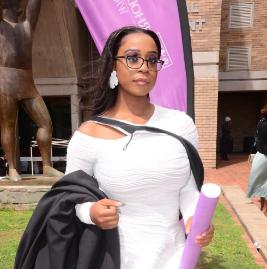
Ntokozo Sibisi, fondly known as Zoeh among her former ‘tutlings,’ graduated in October 2023 with a Masters in Anthropology. Reflecting on her anthropological journey over the years, she expressed, “We’ve always joked that you don’t choose anthropology—it chooses you.” She continued, “Knowing this, we were able to let go of our concerns about where we would work and what we would do with our degrees in anthropology. The path that was meant for me has undoubtedly opened doors and challenged preconceived notions.”
Her passion for anthropology was most significant in the focus of her research. Zoeh's thesis was a phenomenological analysis that explored the impact of COVID-19 lockdown restrictions on funerary rituals. This particular focus stemmed from her observations of the many challenges faced by bereaved individuals coping with the loss of loved ones in the initial stages of the COVID-19 pandemic in 2020. As she developed her proposal, Zoeh was encouraged by the difficulties experienced by families in her community, in the Midlands of KZN. She shared that her research took on deeper meaning when her family also experienced the loss of a loved one during the same period and, like many others, they struggled to adhere to certain rituals. Her ethnographic study found that for many bereaved families ‘social distancing’ was traumatic and significantly threatened their mental, emotional, and spiritual well-being.
Her journey following the undergraduate phase in anthropology led her through diverse landscapes. She mentioned, “My experience with anthropology has been lovely, with many highs and lows, but each with a wonderful tale to tell and a valuable lesson to learn.” Reflecting on her educational transition, she added, “I went from not knowing what anthropology is, to forsaking my ambitions for law for medical anthropology. In my second year, I fell in love with medical anthropology.”
Upon leaving RU Anthropology for ‘the world’, Zoeh has been predominantly engaged in clinic research. She started as a Research Intern at the Human Sciences Research Council (HSRC), and she is currently contributing to the TB HIV Investigative Network (THINK). She noted her versatile application of anthropological insights in her roles, and highlighted the value of her academic training. Zoeh said anthropology enabled her to collaborate with a surgical team on colorectal cancer research and clinical trials. Detailing her current focus at THINK, she said, “I will be involved in a TB clinical trial. I get the opportunity to do research and provide the best evidence on what suspending agent(s) and flavours to use in creating extemporaneous suspensions of key medications for RR-TB treatment for child patients.” This, she emphasised, exemplifies the vast potential that being an anthropologist has granted her, as it has allowed her to blur the lines between humanities and sciences.
Zoeh expressed gratitude for the friendships forged during her anthropological journey, naming incredible companions such as Lebo, Sthe, Rinisa, and Kirsten.

